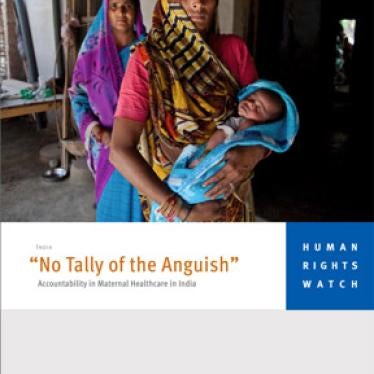Dear Melinda Ching,
Human Rights Watch recently published a report on preventable maternal mortality and morbidity and human rights, titled "No Tally of the Anguish: Accountability in Maternal Health Care in India." The full report is available at: https://www.hrw.org/sites/default/files/reports/india1009web_0.pdf.
In discharging the mandate contained in OP 6 of Human Rights Council resolution 11/8 to identify the human rights dimensions of preventable maternal mortality and morbidity, we encourage the OHCHR to include substantive as well as procedural human rights dimensions.
In this regard, the links between preventable maternal mortality and morbidity to substantive human rights such as the rights to life, health, and non-discrimination have already been established and confirmed by the Council's resolution. Our research and experience indicate that the procedural human rights obligations to transparency, accountability, and equitable progressive realization are no less important in preventing maternal death and disability. While much is known about the policies, infrastructure, and mechanisms needed to lower preventable maternal mortality and morbidity, little is done to monitor, evaluate, and improve upon the programs already in place. There is therefore a crucial need for accountability, at the international, national, and sub-national levels, to prevent death and to ensure effective use of scarce resources.
In the context of states' commitment to reduce preventable maternal mortality and morbidity, accountability is particularly beneficial and consists of the following:
Ensuring non-recurrence of health system failures and gaps: A transparent and consistent accountability mechanism at the district level would allow states to take timely action to correct health system failures and gaps.
Intervention at the most adequate level: Effective accountability measures require monitoring at the international, national and sub-national levels (district), allowing for direct and swift intervention at the local level as problems are detected, and providing crucial information for more targeted development assistance.
Development and use of needed health indicators: Accountability requires the development of appropriate outcome and process indicators to assess the scope and extent of maternal mortality and morbidity. At the district level, information about maternal deaths is a powerful indicator of gaps. At all other levels, including the district, monitoring based on process should be undertaken in accordance with the 1997 United Nations Process Indicators to Monitor the Availability, Utilization, and Quality of Emergency Obstetric Care (UN process indicators), and the United Nations Guidelines for Monitoring the Availability and Utilization of Obstetric Services (UN guidelines).
Collection of disaggregated data: To properly monitor the effectiveness of health interventions, data must be disaggregated by socio-economic indicators such as education status, income, religion, and caste to reveal whether healthcare programs are accessible to and being utilized by all communities. This data collection is useful for the evaluation of other health programs too.
Long-term and short-term benefits: Monitoring for accountability purposes is both short-term and long-term. Demographic surveys are a stop-gap measure of obtaining information. A strong vital or civil registration (registration of births and deaths) is a powerful long-term monitoring tool not only for maternal mortality reduction but for the progressive realization of many other concerns with a direct impact on maternal mortality, such as early marriage.
Creation of a grievance redressal mechanism: Access to effective grievance redressal mechanisms is a key component of all human rights, including the right to health. In relation to health interventions, such mechanisms tend to enhance trust in the public health system, and thus the effectiveness of the interventions themselves.
It is crucial that the OHCHR, in its report to the Council, identify these procedural human rights dimensions of preventable maternal mortality and morbidity as already existing in the international legal framework. Without such a focus, the Millenium Development Goal on improving maternal health will continue to be out of reach for the majority of the world's countries. Worse still, the resources poured into maternal health improvement schemes will likely not benefit those women for whom they are intended.
We look forward to working with you on this, and remain at your service for any additional information.
Sincerely,
Liesl Gerntholtz
Executive Director
Women's Rights Division
Human Rights Watch








